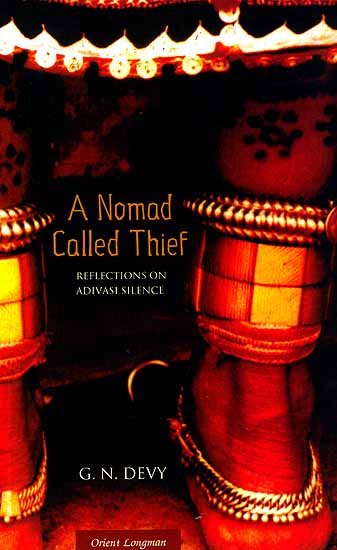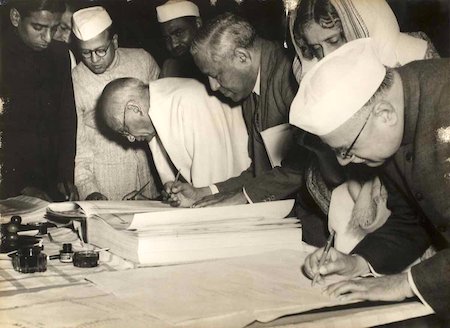
Reflections on Adivasi Silence and Voice by Ganesh [G.N.] Devy | Publications >>
Tribals are subject to oppression and cruelty even after independence and still picked up by the investigating officers to cover up shoddy investigations, Supreme Court Judge Justice D.Y. Chandrachud said on Monday.
Justice Chandrachud was speaking at the 13th B R Ambedkar Memorial Lecture on the topic of ‘Conceptualising Marginalisation: Agency, Assertion & Personhood’ by the Indian Institute of Dalit Studies, (IIDS) Delhi and Rosa Luxemburg Stiftung, South Asia.
The top court judge said even if a discriminatory law is held unconstitutional by the courts, or is repealed by parliament, the discriminatory behavioural pattern is not immediately overturned.
“Constitutional and legal mandates are not sufficient to protect the rights of the marginalised group including Dalit and tribals,” he said.
“The British Raj enacted the Criminal Tribes Act 1871 through which a tribe, gang, or class of persons addicted to the systemic commission of offences were notified. The Criminal Tribes Act was later repealed in 1949 once our Constitution was enacted, and the tribes were ‘de-notified’.”
“However, even after nearly seventy-three years since the tribes were de-notified, the members of the tribes are still subject to oppression and cruelty. Members of the de-notified tribes are still picked up by the investigating officers to cover up shoddy investigations,” Justice Chandrachud said.
Referring to a top court judgement, he said, “This Court in Ankush Maruti v. the State of Maharashtra allowed a review petition filed against the conviction of six accused persons on rape and murder charges.”
“The decision judicially recognised that the members of the nomadic tribes belonging to the lower strata of the society are regularly harassed by investigating agencies by using the forces of criminal law,” Justice Chandrachud said.
The apex court judge said that the Constitution mandates redistribution of material resources to further the constitutional ideal of substantive equality. […]
“However, without the fulfilment of the principle of recognition, the ideals of both formal and substantive equality would not be sufficient to address concerns of freedom. It is only through recognition that our existence as social beings is generated,” he said.
Justice Chandrachud said humiliation is perpetuated by the institutions and the society.
“The members of the marginalised communities can also be institutionally humiliated not merely by using the tool of law but also by establishments that further a conducive environment for discrimination and humiliation to be perpetuated. Even if a discriminatory law is held unconstitutional by the Courts, or is repealed by the parliament, the discriminatory behavioural pattern is not immediately overturned,” he said.
Justice Chandrachud said that treating every person as an individual, irrespective of their differences and membership of multiple groups would not be sufficient to gain personhood (status of being a person).
“Hence, members of the marginalised communities would be able to gain complete personhood only by assertion and recognition of their group identities. The international framework and the Indian Constitution facilitate this approach, of identifying an individual as a member of the group to remedy marginalisation.”
“What I mean is that the only way for the members of the marginalised communities to achieve personhood is through social mobilisation as a collective against discrimination. Such mobilisation should not be considered as ‘politics of identity but as a necessary means for redressing historical discrimination,” he said. […]
Justice Chandrachud said combating something as prevalent and deep-rooted as marginalisation is no easy task, and does not have solutions.
“The only recourse available to us is to faithfully abide by and give life to the constitutional ideals which Dr Ambedkar helped formulate, and use those to bring transformative change in the minds and perceptions of the society,” he said.
Source: ‘Members of De-Notified Tribes Picked Up to Cover Up Shoddy Investigations’: Justice Chandrachud, PTI (The Wire, 7 December 2021)
URL: https://thewire.in/rights/members-of-de-notified-tribes-picked-up-to-cover-up-shoddy-investigations-justice-chandrachud
Date Visited: 8 December 2021
“It’s a long road to freedom!” – Stan Swamy (the late sociologist and activist for Adivasi rights), quoted in “I am Not a Silent Spectator: Why Truth has become so bitter, Dissent so intolerable, Justice so out of reach” | Indian Social Institute, Bangalore, 2021 | Accountability >>
In pursuit of “equality for all the citizens”: National Legal Services Authority asked to provide free legal consultations to Scheduled Tribes (ST) – Supreme Court >>

Photo: The Better India >>
Bhimrao Ramji Ambedkar (1891–1956): “Indian jurist, economist, social reformer and political leader who headed the committee drafting the Constitution of India [and] served as Law and Justice minister in the first cabinet of Jawaharlal Nehru” | Wikipedia >>
“The State shall not discriminate against any citizen on grounds only of religion, race, caste, sex, place of birth or any of them.” – Constitution of India & National Human Rights Commission >>
“Religion is a personal matter and should not be politicised.” – Invitation by the Bharat Jodo Abhiyan (BJA) – a civil society platform involving organisations from across 15 states – extended to all like-minded citizens “who take pride in our progressive, inclusive civilization and are committed to our constitutional values of fraternity, liberty, equality and justice” | TheWire (2 January 2024) >>
“The Indian constitution had to empower the state to enter into the realm of Indian society and transform it by eradicating deeply embedded economic, political and social hierarchies.” – “The Foreign and the Indigenous in the Indian Constitution: Constitution Day talk” by Arun Thiruvengadam (Centre for Law and Policy Research, Bangalore, 2 December 2015)
“Tribals are subject to oppression and cruelty even after independence and still picked up by the investigating officers to cover up shoddy investigations. […] The only recourse available to us is to faithfully abide by and give life to the constitutional ideals which Dr Ambedkar helped formulate, and use those to bring transformative change in the minds and perceptions of the society.” – Supreme Court Judge Justice D.Y. Chandrachud (The Wire, 7 December 2021)
Learn more
Adivasi Academy & Museum of Adivasi Voice at Tejgadh
Adverse inclusion | Casteism | Rural poverty
Anthropology | eBooks, eJournals & reports | eLearning
Central Institute of Indian Languages (CIIL) Mysore
Colonial policies | Denotified Tribe vs. “criminal tribe“ | Imprisonment & rehabilitation
eBook | Adivasi Stories from Gujarat – Bhasha Research and Publication Centre (Vadodara)
eBook | Background guide for education
Endangered language | PeoplesLinguisticSurvey.org
Ganesh [G.N.] Devy | Publications | Lecture “A View of Higher Education in India”
History | Colonial policies | Freedom Struggle | Independence
Human Rights Commission (posts) | www.nhrc.nic.in (Government of India)
India’s Constitutional obligation to respect their cultural traditions
Languages and linguistic heritage
Literature and bibliographies | Literature – fiction | Poetry
Multilingual education is a pillar of intergenerational learning – Unesco
Museum & Society – A re-evaluation of Adivasi Heritage by Prof. Ganesh Devy
People’s Linguistic Survey of India | Volumes (PLSI) | PeoplesLinguisticSurvey.org
Scheduled Tribes | Classifications in different states
Video clips taken at Tejgadh and related information
Video | “Nations don’t make us human – languages make us human”: Ganesh Devy
Video | Tribes in Transition-III: “Indigenous Cultures in the Digital Era”